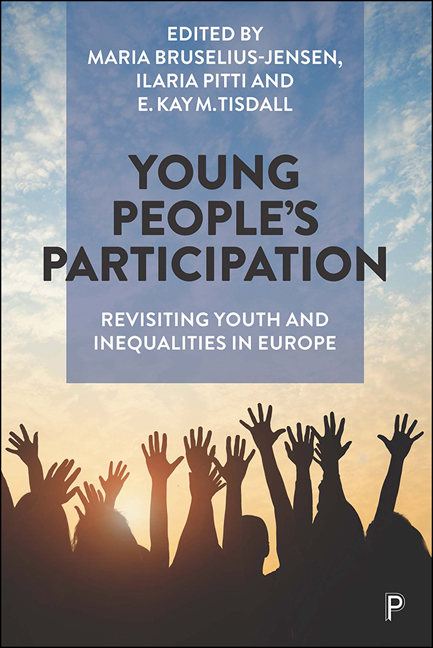Book contents
- Frontmatter
- Contents
- List of figures and tables
- Notes on contributors
- Acknowledgements
- 1 Revisiting young people's participation: an introduction
- PART I Young people's experiences of participation and engagement
- PART II Current state and conditions for young people’s participation: critiques and trends
- PART III Broadening participation: young people's own approaches to participation
- PART IV New opportunities for young people's participation: facilitating new forms of youth participation
- Index
1 - Revisiting young people's participation: an introduction
Published online by Cambridge University Press: 18 December 2021
- Frontmatter
- Contents
- List of figures and tables
- Notes on contributors
- Acknowledgements
- 1 Revisiting young people's participation: an introduction
- PART I Young people's experiences of participation and engagement
- PART II Current state and conditions for young people’s participation: critiques and trends
- PART III Broadening participation: young people's own approaches to participation
- PART IV New opportunities for young people's participation: facilitating new forms of youth participation
- Index
Summary
Over 30 years after the United Nations Convention on the Rights of the Child (UNCRC) was ratified by the United Nations (UN) General Assembly in 1989, young people's active citizenship and participation rights have gained increased attention in both academia, policy and practice (Westwood et al, 2014; Gal and Duramy, 2015; McMellon and Tisdall, 2020). In particular, young people's civic participation is promoted at local, national and regional levels through such organisations as the European Union, UNICEF and international non-governmental organisations (NGOs). Young people's participation has become a major rights issue and one gaining increasing policy and practice importance.
While the UNCRC addresses the human rights of children under the age of 18, attention to participation also extends to older young people. Political institutions, research and society are concerned about young people's societal engagement, carried by fears that new generations of European youth are unengaged and disinterested in politics and have lost trust in democratic institutions (Loncle et al, 2012), and that this will lead to a crisis in democracy. Such a deficit perspective has been counteracted by recent research, which demonstrates that young people are often not uninvolved but they use forms and means other than formal participation to engage in society and to influence politics (Quintelier, 2007; Pohl et al, 2020). Whether constructing youth participation as in crisis or changing, institutions from social work to education are investing in supporting, facilitating and educating young people to be engaged societally as the ‘citizens of tomorrow’ (Walther et al, 2020).
Young people of recent generations have grown up not only with the right to be consulted, but also with multiple initiatives to support their democratic education and facilitate their engagement (Taru et al, 2014). Key actors such as municipalities, institutions and NGOs advocate giving ‘voice’ to young people and consulting them on matters that concern their lives (Kjellander et al, 2016). However, professionals can be unsure about how to include young people in change and decision making, while institutional structures may create barriers as well as opportunities (Tisdall et al, 2014). With participation activities proliferating, the book is timely in assessing the ways in which young people experience such activities, their transformative potential both personally and for society, and the ways in which adults and organisations do or do not support such participation.
- Type
- Chapter
- Information
- Young People's ParticipationRevisiting Youth and Inequalities in Europe, pp. 1 - 14Publisher: Bristol University PressPrint publication year: 2021

